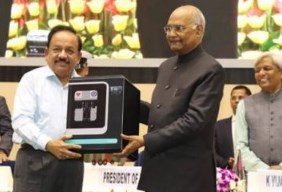First Indigenous High-Temperature Fuel Cell System launched
The President of India Ram Nath Kovind launched the first Indigenous High-Temperature Fuel Cell System developed by Council of Scientific and Industrial Research (CSIR) under ‘New Millennium Indian Technology Leadership Initiative (NMITLI)’. The launched was made at Vigyan Bhawan in New Delhi on the occasion of 78th Foundation Day CSIR.
About High-Temperature Fuel Cell System
The system has been developed under India’s flagship program ‘New Millennium Indian Technology Leadership Initiative (NMITLI)’.
It has been developed by CSIR in partnership with Indian industries. This makes it a unique example of Public-Private Partnership (PPP) among CSIR’s three Laboratories- (CSIR-NCL, Pune; CSIR-NPL, New Delhi; CSIR-CECRI, Karaikudi (Chennai Center)) and two Indian industries namely, M/s Thermax Limited (Pune) and M/s Reliance Industries Limited (Mumbai).
Function:
The 5.0 kW fuel cell system generates power in a green manner. It uses methanol or bio-methane, with heat and water as bi-products for further use. This further amounts to more than 70% efficiency, which otherwise may not be possible by other energy sources.
Fuel Cells developed are based on High-Temperature Proton Exchange Membrane (HTPEM) Technology.
Application:
In the field of clean energy, Fuel Cell distributed power generation systems are emerging as one of the most promising alternative to grid power.
This development is most suitable for distributed stationary power applications and where highly reliable power is essential with simultaneous requirement for air-conditioning such as- for small offices, data centers, commercial units, etc.
It will also meet the requirement of efficient, clean and reliable backup power generator for telecom towers, remote locations as well as strategic applications.
Fuel Cells fit well in India’s mission of replacing diesel with green and alternate fuels, thus this development would replace Diesel Generating (DG) sets and will help in reducing India’s dependence on crude oil.
Month: Current Affairs - September, 2019


